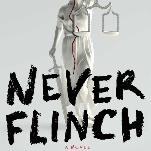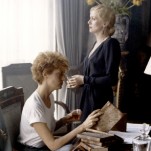By the time Jean Genet made Un Chant D'Amour in 1950, he was already an infamous poet-pornographer whose novels and plays were banned internationally for their explicit descriptions of romping gay men and gorgeous criminals. Decades later, Genet maintained his antisocial image by writing reverentially about African-American radicals and the P.L.O. Transgression and eroticism remained forever tied in Genet's art, which shouldn't be surprising, since he came of age in an era when homosexuality was against the law, and for many, being a crook inevitably became a turn-on. Once Genet got access to a movie camera, he turned it on a group of rugged actors, playing imprisoned men who literally claw at the walls, overcome with thwarted desire. And when the stars of Un Chant D'Amour aren't scratching their palms against the plaster, they're unbuttoning their pants and stroking themselves.
Un Chant D'Amour looked scandalous in 1950, and it's hardly tame today. It's a sweaty, impressionistic silent film that, for just over 20 minutes, uses a crude scenario—a jailor peeking in on his charges—as an excuse to thread together extreme, strikingly lit close-ups of hair, sweat, moony faces, and erect penises. Genet cycles through the same images too often, and he overdoes the symbolism by showing one prisoner grasping for a bouquet of flowers he can never reach, and another being forced to suck the barrel of a gun. But much of Un Chant D'Amour's vision still feels feverishly inspired, like the famous shots of two prisoners blowing cigarette smoke to each other through a crack in their adjoining cell wall. Films beyond Todd Haynes' Genet-quoting Poison owe a debt to Un Chant D'Amour. Every post-1950 filmmaker who has explored obsession and desire has walked in Genet's footsteps, and re-learned how the intensely erotic can become indistinguishable from the surreal.
Key features: A Jonas Mekas introduction and a Kenneth Anger commentary provide context for the film, and a second disc adds two lengthy Genet interviews—one from 1981 and one from '82—in which, among other things, he talks about how an unschooled drifter like him learned to bend French grammar to his will.








































